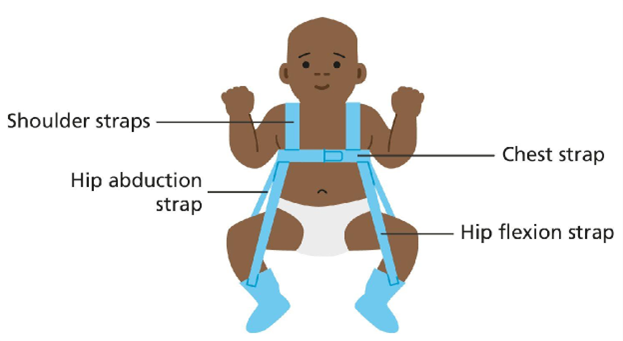A nurse is reinforcing teaching with the parents of an infant who has a Pavlik harness.
Which of the following statements should the nurse include in the teaching?
You can apply lotion under the straps of the harness.
The harness can be removed for sleeping each night.
The harness can promote hip joint development.
You should place the diaper over the strap of the harness.
The Correct Answer is C
Explanation:
The Pavlik harness is a device used to treat developmental dysplasia of the hip (DDH) in infants. It helps position the hips in a way that promotes proper hip joint development. By keeping the hips in a flexed and abducted position, the harness helps to align the hip joint properly, allowing for normal development.
A- Applying lotion under the straps of the harness is not recommended as it can interfere with the harness's effectiveness and may cause skin irritation.
B- The harness should not be removed for sleeping unless specifically instructed by the healthcare provider. It is typically worn continuously to ensure consistent hip positioning and optimal treatment outcomes.
D- Placing the diaper over the strap of the harness is not recommended as it can cause discomfort for the infant and may interfere with the proper fit and function of the harness. The diaper should be placed under the harness straps to ensure a secure and comfortable fit.

Nursing Test Bank
Naxlex Comprehensive Predictor Exams
Related Questions
Correct Answer is D
Explanation
Using the overbed trapeze helps the client strengthen their upper body and improve mobility by allowing them to independently move and reposition themselves in bed. This promotes independence in activities of daily living and reduces reliance on nursing assistance.

Cautioning the client to avoid a prone position while in bed is important for preventing pressure ulcers and maintaining proper positioning, but it does not specifically promote independence and mobility.
Keeping a loose, absorbent dressing over the surgical site is important for wound care and infection prevention, but it does not directly promote mobility or independence. Maintaining abduction of the client's residual limb with a pillow is important to prevent contractures, but it does not directly promote mobility or independence.
Correct Answer is D
Explanation
The APN, also known as a nurse practitioner or clinical nurse specialist, has advanced knowledge and expertise in pharmacology and medication management. They are trained to assess medication interactions, evaluate potential risks, and provide guidance to ensure safe and effective medication use.
The other members of the interdisciplinary team listed are not specifically trained to address medication interactions:
Social workers focus on addressing psychosocial aspects of care, such as emotional support, counseling, and resource coordination. While they may provide valuable assistance in various areas of the client's care, they typically do not have specialized knowledge in medication interactions.
Patient care technicians, also known as nursing assistants or certified nursing assistants, provide direct patient care under the supervision of nurses. They do not typically have the training or authority to address medication interactions.
Psychologists specialize in the assessment, diagnosis, and treatment of mental and emotional health concerns. While they may be involved in the client's overall care, including medication management for mental health conditions, their expertise lies primarily in psychological assessment and therapy rather than medication interactions.
Whether you are a student looking to ace your exams or a practicing nurse seeking to enhance your expertise , our nursing education contents will empower you with the confidence and competence to make a difference in the lives of patients and become a respected leader in the healthcare field.
Visit Naxlex, invest in your future and unlock endless possibilities with our unparalleled nursing education contents today
Report Wrong Answer on the Current Question
Do you disagree with the answer? If yes, what is your expected answer? Explain.
Kindly be descriptive with the issue you are facing.
